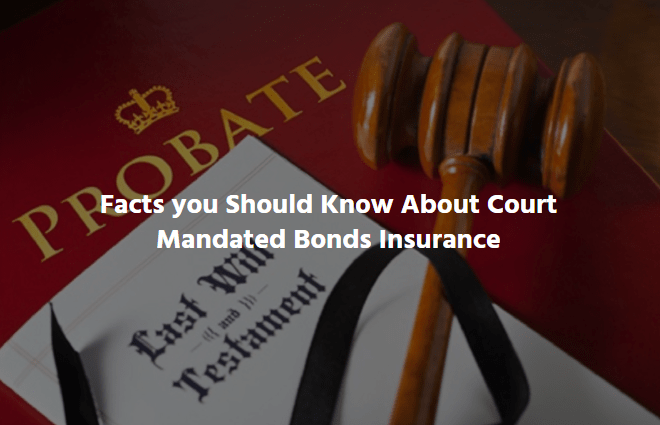
Facts you Should Know About Court Mandated Bonds Insurance
An individual may need his or her assets protected until the court proceedings are over. For this purpose, court mandated bonds insurance is used. Court bonds are also called judicial bonds or court surety bonds. They have many further types. In fact, the term court bonds is an umbrella term which covers bonds for a wide range of legal proceedings. They are a form of surety bonds insurance which provide assurance to citizens that their assets will not be endangered. Court bonds can be easily dissolved once the proceedings are over and refunded in full.
Court Mandated Bonds Insurance Protects Individuals in Legal matters against Fraudulent Activities.
Court Mandated Bonds Insurance Works Only in Legal Proceedings
Court ordered bonds insurance are required during certain legal activities. They provide a protection for the party which has bought them against any activities that may be financially harmful. They protect against fraud and unauthorized usage of individual’s funds by any other party involved in the case.
Many types of Court Mandated Bonds Insurance are Available
As stated above, court bonds represent many sub categories, since it is an umbrella term. The most common types of court bonds are as follows;
Appeal Bonds
These bonds provide coverage for the amount to be paid by a defendant when judgement goes against him or her. It allows for the payment to be delayed while appeal process moves on. The bond must be in place during appeal process.
Attachment Bonds
Attachment Bonds provides protection against the wrongfully attached property to the defendant during court proceedings. It is categorized as a sub type of plaintiff bond. The bond provides coverage if judgement goes against the individual. It covers the cost plus interest.
Indemnity to Sherriff Bond
This bond is used to provide a protection to the law enforcement personnel. If they seize someone’s property on court orders, it gives them immunity against prosecution. It is wise to purchase this bond for law enforcement officers to avoid headaches.
Plaintiff’s Bond
If court rules against plaintiff in a case and orders compensation to be paid to defendant, this bond ensures that payment is paid in full. There are sub categories of plaintiff’s bond. They differ by nature of
the case.
Replevin Bonds
This bond provides a plaintiff a way to secure a property against being dismantled or sold. This is a type of plaintiff bond. It protects the defendant in case property is sold or damaged in any way. This type of bond is usually required in civil cases where a property’s fate is determined. Such as divorce cases.
Probate Bonds
Probate bonds are designed to protect an individual against losses cased by fiduciary’s failure to complete a task or obligation. It has further categories which are as follows;
Administrator Bonds
These bonds are bought to ensure that estate of an individual will be administered properly in case of their death. These bonds compensate for the lack of a will.
Executor Bonds
Executor bonds provide protection to inheritors against fraudulent action performed by the executor of a will.
Conservator Bonds
These bonds allow a conservator to maintain responsibility for assets and finances of a minor. They can also be applied towards an adult who has been declared incapable of handling one’s financial matters. Such as a medically infirm person.
Guardianship Bonds
Guardianship bonds are required for those individuals who act on someone else’s behalf. Sometimes courts appoint a responsible and respectable individual as a guardian. This bond is for them.
The Cost of Court Bonds Varies Bond to Bond
Court mandated bonds insurance is usually regarded as a riskier venture than buying other forms of bonds. Their cost is higher relative to other bonds. Not only that, but their terms are also more stringent. Court bonds usually cost anywhere from 1% to 10% of the total bond amount, plus interest. There are two primary factors that determine the cost of court bonds.
- The credit and financial strength of the individual
- The character of the person to be bonded
There are some sureties which require judicial bonds insurance to be kept as a collateral. This allows them to mitigate some of the risk associated with the bonds. Collateral is a common requirement in case of court bonds. But the amount of collateral is once again dependent upon two factors above.
My Thoughts
SGA Financial Inc. can provide you with bonds nation wide. We have years of experience providing all types of court bonds to our faithful clients. Our bond agents are ready to help you fulfill surety bonds format in court.

